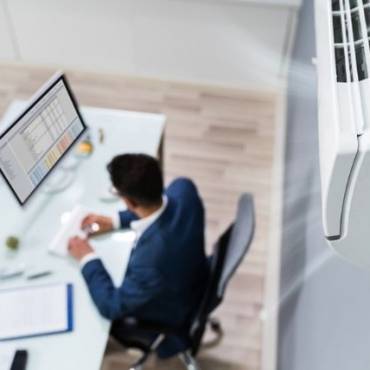How Does Air Conditioning Help to Keep Your Office Safe from Germs?
Ventilation Helps to Reduce the Risk of Falling Ill
While it can be tempting to keep the windows shut, especially when it’s cold outside, low ventilation can make it easier for viruses and bacteria to spread.
In stagnant air, these pathogens linger, increasing the risk of inhaling a range of illnesses, such as the common cold and a range of other respiratory viruses. Coronavirus can also be spread this way, too, which is worth bearing in mind.
Air conditioning works by drawing in fresh air from the outside, then circulating it around the room. This process helps disperse and filter out air droplets that contain bits of virus or other harmful germs.
Furthermore, if you’re looking to use your air conditioning system as a way of reducing the risk of spreading ailments, such as Covid, and other diseases from air conditioning, you need to ensure that any re-circulation settings are turned off – otherwise, you are spreading potentially infected air around the office.
Instead, make sure the rate of air change settings is set high so that as much outside air as possible is brought into the office. This helps to reduce the transmission of viruses and bacteria from air conditioning to more manageable levels.
If you’re considering updating your air conditioning to make your office space safer to work in, it’s worth looking at the guidelines set out by the World Health Organisation. They teamed up with technical experts from fields including infection control, aerobiology, and engineering to create a roadmap that offices can use to improve their ventilation and reduce the risk of germs spreading through air conditioning.
WHO Ventilation Roadmap: Key Takeaways
To help mitigate the spread of diseases from air conditioning, The World Health Organisation (WHO) recommends a ventilation rate of 10 litres per second per person. If your air conditioning unit isn’t capable of performing at this rate, you should consider implementing the following:
- Disable demand-control ventilation controls that reduce air supply based on room temperature or occupancy
- Consider opening windows, as well as using your air conditioning unit if you can’t increase ventilation mechanically
- Reduce the capacity of the room so you achieve the 10 litres per second person recommendation
- Consider using a standalone air cleaner, particularly in areas often used by people
If your air conditioning unit is capable of performing at 10 litres per second per person, consider implementing the following additional measures:
- Use fans to further distribute the clean air
- Make sure your air conditioning unit is fitted with the ultimate filters for ventilation (within its ventilation capacity)
- Make sure your air conditioning system is periodically maintained, including cleaning and changing filters
- Consider using standalone air cleaners, in addition to your air conditioning unit to maximise ventilation
Cool-Tec Can Optimise Your Air Conditioning to Increase Ventilation
If you’re looking to make your office safer while reducing the spread of viruses and bacteria from air conditioning, our HVAC specialists can help. We will ensure that your air conditioning unit is installed to keep the air in your office as clean as possible.
Cool-Tec’s team are friendly, knowledgeable, and have over 30 years’ experience in maintaining and repairing air conditioning systems. Why not give us a call today on 0800 0189941 and see what the our team can do for you? We are on hand 24 hours a day, 7 days a week for emergency call-outs.



